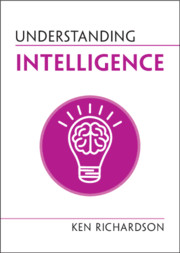Book contents
- Understanding Intelligence
- Series page
- Understanding Intelligence
- Copyright page
- Reviews
- Contents
- Foreword
- Preface
- 1 Testing, Testing
- 2 In the Genes?
- 3 Intelligent Systems
- 4 Intelligence Evolving
- 5 Intelligent Development
- 6 Intelligent Machine?
- 7 Becoming Human
- 8 Individual Differences
- 9 Promoting Intelligence
- Summary of the Book
- Summary of Common Misunderstandings
- References
- Index
2 - In the Genes?
Published online by Cambridge University Press: 13 January 2022
- Understanding Intelligence
- Series page
- Understanding Intelligence
- Copyright page
- Reviews
- Contents
- Foreword
- Preface
- 1 Testing, Testing
- 2 In the Genes?
- 3 Intelligent Systems
- 4 Intelligence Evolving
- 5 Intelligent Development
- 6 Intelligent Machine?
- 7 Becoming Human
- 8 Individual Differences
- 9 Promoting Intelligence
- Summary of the Book
- Summary of Common Misunderstandings
- References
- Index
Summary
Whether they believe in IQ or not, most people sense that individual differences in intelligence are substantial and at least partly ‘genetic’. The nature–nurture debate about the origins of such differences goes back a long way; at least as far as the philosopher-scientists of Ancient Greece. And most people have probably adopted common-sense views about it for just as long. It is evident today in popular cliches: our genetic blueprints set levels of potential, while nurture determines how much of it is reached; individual differences result from both genes and environments; genes and environments interact to determine individual differences; and so on.
Keywords
- Type
- Chapter
- Information
- Understanding Intelligence , pp. 25 - 43Publisher: Cambridge University PressPrint publication year: 2022

